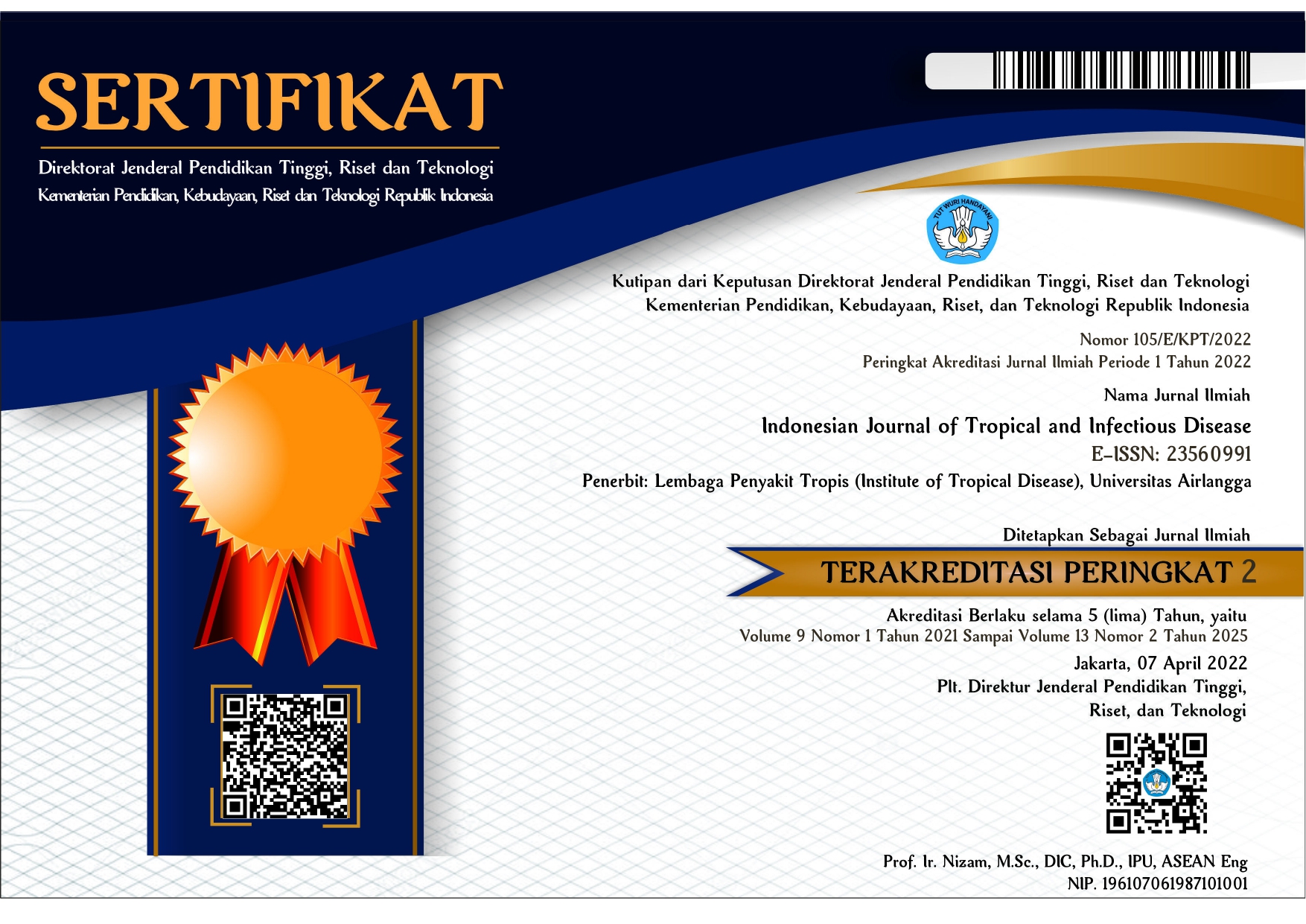LOWER PERCEIVED-STIGMATIZATION BY HEALTH WORKERS AMONG HIV-AIDS PATIENTS OF KEY POPULATION BACKGROUNDS
Downloads
The stigma of people living with HIV-AIDS (PLWHA) by health workers may have a broad impact, so it is necessary to identify the factors that influence the occurrence of stigma. Identification of factors that cause a decrease in stigmatization by health workers will have an impact on improving the quality of life of people with HIV, increasing compliance with medication, and ultimately reducing the incidence of HIV infection itself. The purpose of this study was to analyze factors related to PLWHA's perception of stigma among health workers in the community health center. This research applied a cross-sectional design using interviews. Ninety-four patients from the Infectious Disease Intermediate Care of Dr. Soetomo Hospital Surabaya, a tertiary level hospital, were interviewed. The stigma perception was assessed using a questionnairemodified from the Standardized Brief Questionnaire by Health Policy Project with Cronbach's Alpha of 0.786. The data were simultaneously analyzed with binary multiple regressions on IBM SPSS Statistics 22.0 for Windows software. There were 30 out of 94 patients with key population backgrounds, and most population was injecting drug users (IDUs) and female sex workers (FSWs). PLWHA perceived most stigmatized community health workers when they drew blood, provided care, and considered theywereinvolvedinirresponsiblebehavior. Therewererelationshipsbetween age(p=0.008), maritalstatus(p=0.013), and thehistoryofkeypopulation(p=0.006)to people living with HIV-AIDS (PLWHA)'sperception ofstigma among health workersin East Java community health center. Future research on factorsinfluencingHIV-related stigma isneeded to improve patients' quality of life.
Maman S, dkk. A Comparison of HIV Stigma and Discrimination in Five Internetional Sites: The Influence of Care and Treatment Resources in High Prevalence Settings. Soc Sci Med. 2009;2271–8.
Paryati T, dkk. Faktor-Faktor yang Mempengaruhi Stigma dan Diskriminasi kepada ODHA (Orang Dengan HIV/AIDS) oleh Tenaga Kesehatan: Kajian Literatur. Pustaka Unpad. 2013;
Musthofa SB, Shaluhiyah Z, Widjarnoko B. Stigma Masyarakat terhadap Orang Dengan HIV/AIDS. J Kesehat Masy Nas. 2015;9(4):333–9.
Komisi Penanggulangan AIDS. Strategi dan Rancana Aksi Nasional 2015-2019 Penanggulangan HIV dan AIDS di Indonesia. 2015.
UNAIDS. Fast Track: Ending the AIDS Epidemic by 2030. 2014.
Stringer KL, Turan B, McCormick L, Durojaiye M, Nyblade L, Kempf MC, et al. HIV-realted Stigma among Health Care Providers in the Deep South. AIDS Behav. 2016;115–25.
Maharani R. Stigma dan Diskriminasi Orang Dengan HIV/AIDS (ODHA) pada Pelayanan Kesehatan di Kota Pekanbaru Tahun 2014. J Kesehat Komunitas. 2014;2(5):225–32.
Khairiyah R. Peningkatan Self Regard untuk menyikapi Stigma Masyarakat terhadap Orang dengan HIV/AIDS di Yayasan Abdi Asih Surabaya. Diligib UIN Surabaya. 2018;
Ardani I, Handani S. Stigma terhadap Orang Dengan HIV/AIDS (ODHA) sebagai Hambatan Pencarian Pengobatan: Studi Kasus pada Pecandu Narkoba Suntik di Jakarta Tahun 2017. Bul Penelit Kesehat. 2017;45(2):81–8.
Shisana O, Rehle T, Simbayi LC, Zuma K, Jooste S, Zungu N, et al. South African national HIV prevalence, incidence and behaviour survey, 2012. HSRC Press. 2014;
Health Policy Project. Measuring HIV Stigma and Discrimination Among Health Facility Staff: Monitoring Tool for Global Indicators. 2015.
Sern TJ. The Knowledge, Perceptions, Attitudes, and Perceivd Risk in HIV/AIDS Among Woman in Malaysia: A Cross-Sectional Study. Int J Soc Sci. 2018;8(9):725–34.
Higgins JA, Hoffman S, Dworkin SL. Rethinking Gender, Heterosexual Men, and Women's Vurnerability to HIV/AIDS. Am J Public. 2011;435–45.
Kementerian Kesehatan Republik Indonesia. Laporan Perkembangan HIV/AIDS 7 Penyakit Menular Seksual (PIMS) Triwulan I Tahun 2017. Faktor-Faktor Risiko Penularan HIV/AIDS pada Laki-Laki dengan Orientasi Seks Heterose. 2017.
Kementerian Kesehatan Republik Indonesia. Surveilans Terpadu Biologis dan Perilaku 2011. 2011.
Awofala AA, Ogundele OE. REVIEW HIV: Epideiology in Nigeria. Saudi J Biol Sci King Saudi Univ. 2018;967–703.
Sismulyanto, Supriyanto S, Nursalam. Model to Reduce HIV-related Stigma among Indonesian Nurses. Int J Public Heal Sci. 2015;4(3):184–91.
Harapan H. SciVerse ScienceDirect Discriminatory Attidues toward People Living with HIV among Helath Care Workers in Aceh, Indoesia: A Visa from a Very Low HIV Caseload Region. CEGH Clin Epidemiol Glob Heal. 2013;29–36.
Pala AN, Villano P, Clinton L. Attitudes of Heterosexual Men and Women Toward HIV Negative and Positive Gay Men. J Homosex. 2017;64(13):1778–1792.
NSWP. Stigma and Discrimination Experienced by Sex Workers Living with HIV. 2015.
Deb S. Mentalist Position of Commercial Sex Worker (CSWs with HIV/AIDS). J Indian Acad Appl Psychol. 2008;90–100.
Sharma P, Kirmani MN. Psychotherapy in HIV/AIDS. Int J Indian Psychol. 2015;(3):115.
LeBlanc A. Aging with HIV/AIDS. In R. Settersten Jr & J. Angel (Eds.). Handb Sociol aging. :495–512.
Emlet CA. The Impact of HIV-related Stigma on Older and Younger Adults of AIDS/HIV Care. Psychol Sociomedical Asp AIDS/HIV. 2014;
Emlet C, Brennan D, Brennenstuhl S, Rueda S, Hart T, Rourke S, et al. Protective and risk factors associated with stigma in a population of older adults living with HIV in Ontario Canada. AIDS Care. 2013;1330–9.
Whitehead N, Hearn L, Burrel L. ). The association between depressive symptoms, anger, and perceived support resources among underserved older HIV positive Black/African American adults. AIDS Patient Care STD's. 2014;507–12.
Copyright (c) 2020 Indonesian Journal of Tropical and Infectious Disease

This work is licensed under a Creative Commons Attribution-NonCommercial-ShareAlike 4.0 International License.
The Indonesian Journal of Tropical and Infectious Disease (IJTID) is a scientific peer-reviewed journal freely available to be accessed, downloaded, and used for research. All articles published in the IJTID are licensed under the Creative Commons Attribution-NonCommercial-ShareAlike 4.0 International License, which is under the following terms:
Attribution ” You must give appropriate credit, link to the license, and indicate if changes were made. You may do so reasonably, but not in any way that suggests the licensor endorses you or your use.
NonCommercial ” You may not use the material for commercial purposes.
ShareAlike ” If you remix, transform, or build upon the material, you must distribute your contributions under the same license as the original.
No additional restrictions ” You may not apply legal terms or technological measures that legally restrict others from doing anything the license permits.























